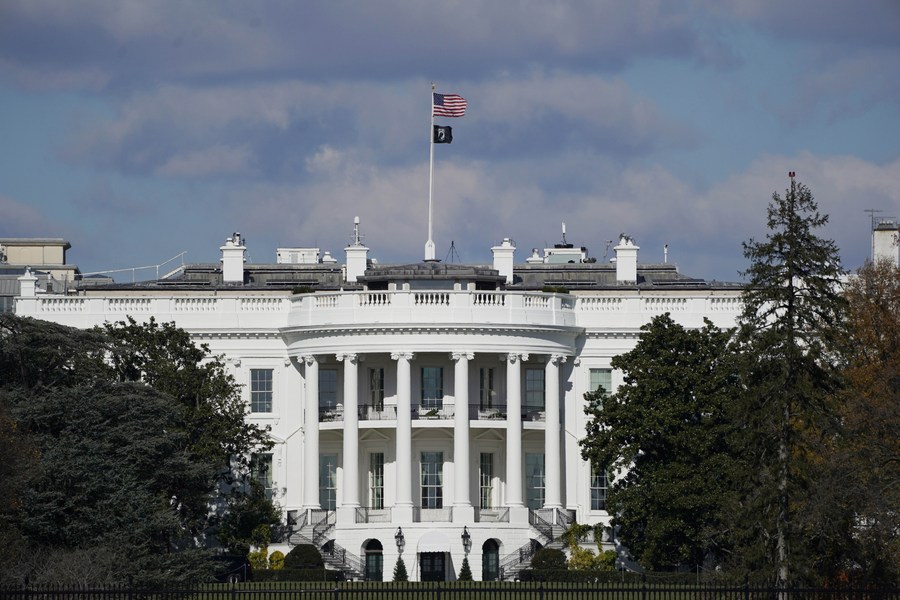Behind the US sanction show
By Xin Ping | chinadaily.com.cn | Updated: 2022-04-16 09:45

"We are confident that everything's going to be alright. We have already been living under sanctions. What else can you do?" When interviewed about his attitude towards US sanctions, a resident of Moscow made such comments with some sort of self-mockery.
We've seen this all before. Data released by the US Treasury Department shows that as of 2021 fiscal year, the number of US sanctions that come into effect amounted to over 9,400. In the past eight years from 2014, the US rallied its allies and partners and imposed 8,068 sanctions designations on Russia. Since the Ukraine crisis broke out, 5,314 new sanctions designations have been slapped on Russia.
And now, while the conflict in Ukraine continues, the U.S. and its allies once again started a sanction show. They put on bans on Russian politicians, exports, energy, athletes, Pyotr Tchaikovsky, Fyodor Dostoevsky, even Russian cats, dogs and trees... simply everything Russian.
The Russians might have been numb about the US sanctions. But still, people simply could not help wondering that, did any of those sanctions solve the problems? Did any of them help to make the world a better place? How are sanctions influencing ordinary people's lives?
Let's have a look at the disastrous impact and consequences around the world, to which the US government and a small number of businesses are turning blind eyes.
In the US, the CPI in March shows an 8.5% year-on-year growth, highest since December, 1981. The food index rose by 8.8% year on year, rice 3.2%, rents 4.4% and energy index an appalling 32%.
In the UK, reports show that the cost for electricity for a household rose from 120 pounds per month to 300 pounds, while the expense for gasoline almost tripled and some 5 million British began to worry about the gas and electricity rate.
In Germany, a major beneficiary of Nord Stream 2, an estimation of up to 2,000 extra Euros will be put on each household’s gas bill.
In Italy, the CPI in March increased by 6.7% year on year, highest since November, 1990.
In Cuba, the official statistic indicated an estimated loss of 150 billion USD over 60 years of US sanctions, an unspeakable trauma for the ordinary Cubans.
In Afghanistan, 7 billion USD worth of Afghan assets were frozen in Washington’s safe, leaving countless Afghans trembling in terror and hunger.
On the contrary, it is obvious who are gaining fat, and busy reaping what they have sowed and plotted. The Hill reported that Lockheed Martin's share price has skyrocketed by around a quarter since the beginning of 2022, Northrop Grumman and General Dynamics around 12%.
While the Russian provision of energy to EU countries was suspended, the US promised to additionally export to the EU at least 15 billion cubic meters of liquefied natural gas this year, which accounts for 10 to 12% of the current export volume, according to the New York Times.
While the US ban on Russian grain export severely jeopardized global food safety, the top four agribusiness unicorns, three of which are American, must be applauding for the soaring food price. In particular, three members of the Cargill family, who are from one of the unicorns, and are all on the Bloomberg list of the 500 richest people in the world, are getting 20% richer this year along.
This is how US sanctions worked to make the rich richer and poor poorer. How are the poor going to survive? Margrethe Vestager, the EU Commissioner for Competition and Executive Vice-President of the European Commission, offered a solution to "control your own and your teenager's showers. And when you turn off that water, you say: 'Take that, Putin!'". What a genius.
Take that, the world! Sufferings caused by US sanctions do not end here. They are profoundly and contagiously harmful in a long run.
More thrillingly, the unilateral sanctions raised by the US is stalling our efforts to achieve global economic recovery and is undermining international cooperation. It took us decades to establish a steady and smooth global industrial and supply chain, in which each country, though at different speeds, could prosper and thrive. However, while the scars left by the rampant coronavirus are just about to form a scab, by putting on sanctions, the US once again cut it up like a vampire and leave us all bleeding until we dry up.
On a large-scale and serious note, the US is aiming for geopolitical leverage through its sanctions. When energy became a problem with Russia, the American government turned to negotiate in a condescending way with Iran and Venezuela, its previous sanction targets, to strike deals of easing or lifting previous sanctions, as if it was some kind of reward from the US. Meanwhile, those who chose not to side with the US on sanctions will automatically receive Washington's coercive warnings -- "watch out for where you stand".
Xin Ping is a commentator on international affairs, writing regularly for Global Times, China Daily, etc. He can be reached at xinping604@gmail.com.
If you have a specific expertise, or would like to share your thought about our stories, then send us your writings at opinion@chinadaily.com.cn, and comment@chinadaily.com.cn.
























